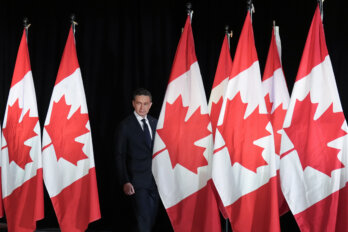I spend too much time on the internet, especially on social media. It’s a compulsion, but I like to think of it as a professional necessity. All that scrolling? That’s research. The internet is real life, after all, populated by real people, with real thoughts, concerns, preferences, and intentions. Lately, one word keeps surfacing in feeds and forums when people talk about a certain leader: reasonable. Guess who that is?
In a recent Liberal Party ad, actor Mike Myers says he’s supporting Mark Carney because the prime minister is “reasonable.” As Myers puts it, “I think the world needs more grown-ups. We need more adults, dude.” I wonder if that’s the first time anybody has ever called Mark Carney “dude” to his face, or anywhere else, but I digress. In the mind of a certain type of voter, Carney is thoroughly in the running for most reasonable among the party leaders. That type of voter probably includes the near majority of Canadians who currently view him favourably.
Being able to claim the throne as a reasonable leader right now, in the face of domestic and foreign chaos and threats, is an electoral godsend. We can deconstruct what counts as “reasonable”—or its cousins “common sense” and “pragmatic”—and whether particular conceptions of either are good or bad, but everyone has a rough sense of what’s reasonable and what’s not. We use it all the time. It’s what makes board-game nights and pickup sports possible.
Strictly speaking, definitions of “reasonable” revolve around being fair, sensible, and moderate and having good sense and sound judgment. Voters, who tend not to be policy experts or ideologues, put a lot of stock in such things, using them as a mental shortcut to help decide who they should support.
Constructions of who and what’s reasonable are at least partially contingent on time, place, and interests. What’s reasonable to a banker or executive or some other sort of professional making a robust six- or even seven-figure salary might not be so reasonable to someone working two or three jobs and struggling to afford groceries (hello, cancellation of the planned increase to the capital gains tax inclusion rate). But in a liberal, capitalist state, what counts as reasonable in the mainstream falls within a narrower band than you might think.
Power shapes conceptions of common sense and what passes as reasonable, enabling some things and constraining others. If you can dominate (social) media platforms, books, schools, forums, workplaces, rallies, and so forth, you can shape how people think of what’s reasonable, and you can decide how people get to live together. Over time, the reasonable comes to be seen as the natural, and vice versa. So much of our lives and democratic institutions depends on us collectively agreeing to be reasonable, and on rewarding or punishing those who aren’t, within whatever conception of reasonable we might construct.
Changing what counts as reasonable can entail upheaval. It can be done, for better or for worse, in more or less constructive ways. For instance, in the United States, Donald Trump has leveraged partisan party identity and psychological needs to belong to an in group, and for tens of millions of people, he’s redefined what counts as reasonable. It’s been an authoritarian, fascistic mess too.
Events and politics can shape what’s reasonable in shorter order, just as they reflect it. The carbon tax, for instance, seemed reasonable for a while, but enough people turned against it, including members of the Liberal caucus who had supported it, that it’s now seen as unreasonable: too divisive, too much of a burden. Carney ended up cancelling it outright. He also opposes an increase to the amount of capital gains that is taxed and supports a 1 percent cut to the lowest tax bracket. He’s promising to protect the environment and social programs, to bolster national defence, to support Canadians through a costly trade war, and to balance the budget in the coming years too. (Details TBD.)
You might think it’s implausible that he can do these things together. You might even think it’s unreasonable to try, or that there are better things to do and ways to do them. I sure do. But Carney’s politics is thoroughly grounded in a conception and construction of what’s reasonable that is likely to come very close to matching that of the fabled (but nonetheless useful) notion of the median voter. The Liberals must not expect that such a voter will read the fine print too closely. They’re probably right.
Reasonableness is also premised on a powerful aesthetic construction. Whatever the substance of his message, Carney both looks and sounds reasonable, not just because he’s an expert economist who speaks with confidence but also because our politics is premised on the idea that leaders who look and sound like him must be reasonable. Carney fits the bill; he fits the constructed image of our reasonable politician: an older, white, male professional who exudes a kind of father-figure appeal to voters who want someone in charge who will protect them during a chaotic time—steady hand on the tiller and all of that.
Is it an accident that so many politicians, for so long, have been older men of a certain look and pedigree? No. Our cultural, political, and economic institutions have been used to laying the groundwork for these men to succeed. It’s the construction and selling of a politician. We can go back to the 1960s and ’70s and this idea of a selling of the US president, as author Joe McGinniss put it, to understand the phenomenon, but we don’t have to. You probably already have an intuitive sense of what it means and entails, of how it works or doesn’t work.
Think of Conservative Party leader Pierre Poilievre, for instance, and how he’s been constructed and sold as a sort of hyper-masculine pugilist who’s quick with the details and a certain answer to whatever problem he’s meant to think through. He’s something between an uber-Chad YouTuber and the kid in your undergraduate class who’s about to respond to the professor with “Well, actually.” The bit works with his base, but for millions of Canadians, he doesn’t read as likeable or reasonable.
To win government in Canada, you don’t need a majority of voters to like you or think you’re reasonable; you just need a plurality. The Liberals know if they can get the “right” 36 to 39 percent of voters—which is to say, voters distributed in a majority of winnable ridings—they can win a minority or even a majority government. They know the path to victory goes through being conceived of as, among other things, reasonable by that plurality.
As things stand, unless the opposition parties can flip the script soon, there’s a fair chance enough voters will see Carney as such and give him their support—and government.
Adapted from “Mark Carney, Mr. Reasonable?” by David Moscrop (Substack). Reprinted with permission of the author.





